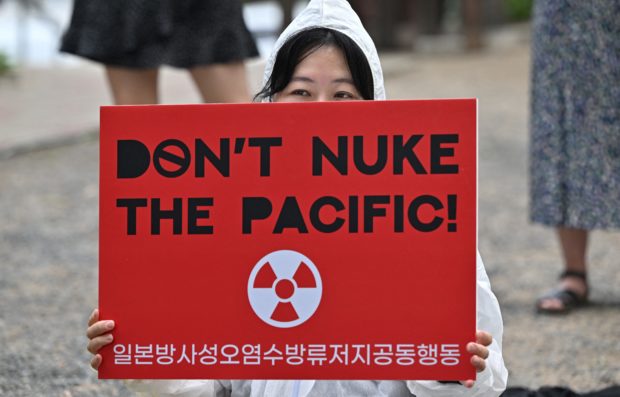Japan regulator OKs release of treated Fukushima water

A South Korean environmental activist holds a placard during a protest in Seoul against Japan’s plan to discharge Fukushima radioactive water into the sea, as they mark World Oceans Day on June 8, 2022. (AFP)
TOKYO, Japan – Japan’s nuclear regulator on Friday formally approved a plan to release more than a million tonnes of treated water from the crippled Fukushima plant into the ocean, sparking an angry reaction from China.
The plan has already been adopted by the government and endorsed by the International Atomic Energy Agency (IAEA), but plant operator TEPCO must still win over local communities before going ahead.
Cooling systems at the nuclear power plant were overwhelmed when a massive undersea quake triggered a tsunami in 2011, causing the worst nuclear accident since Chernobyl. Decommissioning work is under way and expected to take around four decades.
Each day, the site produces 140 cubic metres of contaminated water — a combination of groundwater, seawater and rainwater that seeps into the area, and water used for cooling.
The water is filtered to remove various radionuclides and moved to storage tanks, with 1.29 million tonnes on site already and space expected to run out in around a year.
Article continues after this advertisementThe country’s Nuclear Regulation Authority approved the release, according to a foreign ministry statement, which said the government would ensure the safety of the treated water and the “reliability and transparency of its handling”.
Article continues after this advertisementBut Chinese foreign ministry spokesman Wang Wenbin lashed out at the plan, saying it “relates to the global marine environment and the public health of Pacific Rim countries, and is by no means a private matter for Japan”.
“If Japan insists on putting its own self-interest above the international public interest and insists on taking (this) dangerous step, it will definitely pay the price for its irresponsible behaviour,” Wang told reporters at a regular briefing.
TEPCO says the treated water meets national standards for radionuclide levels, except for one element, tritium, which experts say is only harmful to humans in large doses.
It plans to dilute the water to reduce tritium levels and release it offshore over several decades via a one-kilometre-long (0.6-mile) underwater pipe.
The IAEA says the release, which will take place over many years and is not expected to begin before spring 2023, meets international standards and “will not cause any harm to the environment”.
But local fishing communities that suffered in the wake of the nuclear accident fear consumers will once again shun their products if the water is released in the area.
Regional neighbours including China and South Korea, and groups like Greenpeace, have also previously criticised the plan.
The March 2011 disaster in northeast Japan left around 18,500 people dead or missing, with most killed by the tsunami.
Around 12 percent of the Fukushima region was once declared unsafe, but now no-go zones cover around two percent, although populations in many towns remain far lower than before.
gsg
Agence France-Presse